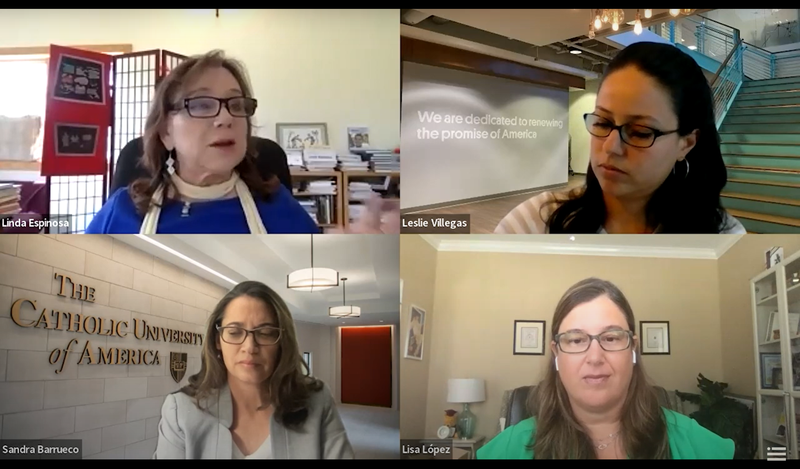Follow-up Q & A with Dual Language Learner Experts on Improving Pre-K Assessments
Blog Post

New America
Nov. 1, 2022
On July 6. 2022, New America partnered with MDRC to host a virtual event on reimagining pre-K assessments for dual language learners (DLLs) where we brought together four researchers and practitioners dedicated to ensuring that assessment tools and practices equitably address DLLs’ particular needs. We followed up with two of the panelists to gather their insights on four key questions that we were not able to answer during the event.
Dr. Lisa López is a Professor of Educational Psychology in the College of Education at the University of South Florida.
Lisa Luceno is Senior Director of Early Childhood Strategy at Briya Public Charter School / Mary's Center in Washington DC.
Question 1: Many state pre-K programs do not currently screen or identify DLLs. What are your thoughts on this issue?
Lisa López: Screening and identifying DLLs is important, not only to identify the services DLLs may need (early intervention is critical), but also to identify the assets DLLs bring into the programs. Screening DLLs is a process that must be done correctly, and this is not always easy as programs may not have the right tools or bilingual certified personnel to accurately perform the screenings.
Lisa Luceno: It’s important for states to have quality screening and identification procedures for DLLs and likewise to prioritize the support system that addresses any needs and recommendations derived from this type of assessment. For example, if it is recommended that more small groups and one-on-one instruction be used along with strategic use of the child’s native language, this should be coupled with funding solutions and strategies to operationalize the guidance. This can be done by disseminating quality and accessible resources for teachers and investing in preparing a culturally and linguistically diverse workforce.
Question 2: Do you have examples of assessment tools that are inclusive of DLLs and account for the linguistic diversity of the population?
Lisa López: From a speech and language perspective, Dr. Liz Peña’s group at UC Irvine have been working for many years on tools for Spanish-speaking DLLs including introducing the Bilingual-English Spanish Assessment (BESA) as well as highlighting the benefits of using dynamic assessment with DLLs. The Individual Growth and Development Indicators (IGDIs) are also available in multiple languages and the IGDI lab at the University of Minnesota has been working on expanding that work as well. I am not certain that any assessment currently available captures linguistic diversity.
Lisa Luceno: Although most assessments have limitations there is good work happening right now that other research experts have mentioned to create and scale assessments that are inclusive and allow for translanguaging so that DLLs can express their full range of knowledge, skills, and abilities in the languages that they know.
Question 3: In your ideal world, what would equity-centered, effective assessments look like for DLLs? And what do you think the key barriers and facilitators of enacting your vision would be?
Lisa López: This is a difficult question to answer because assessments have many different purposes. For day-to-day progress monitoring I don’t think assessments are necessary if the teacher has a solid understanding of what development looks like for a DLL child—something we don’t have a full grasp of—and where their student is on that developmental pathway. I have mentioned dynamic assessment before, and I think that can be a way of understanding the child’s potential. The main struggle with assessments is that language confounds all other skills.
Lisa Luceno: An ideal assessment prioritizes alignment of system data that is actionable for teachers to help them allow for and build upon children’s different cultural and linguistic expressions. This requires that assessors are well prepared and trained to see those things. There are real barriers and pressures on educators that exacerbate the present issue of teachers leaving the field en masse and it’s important to be cautious and intentional about what assessments are used for. Scoring schools and rating teachers can add to these pressures, so any successful vision must include steering away from enacting punitive accountability systems, and instead use assessments to highlight what’s working and provide support for areas that need improvement.
Question 4: What is the top thing that you want researchers/assessment developers to focus on as they work on improving these assessments for children that come from linguistically diverse homes?
Lisa López: It is important for researchers to understand the heterogeneity of the DLL population. This includes culture, background knowledge, and how the child’s languages interplay. How do we capture the uniqueness of the population while assessing what the child knows? This makes standardization very difficult. And it is important we start from scratch because translating something that is already out there is not good enough.
Lisa Luceno: Ensuring that new and quality assessments are inclusive as well as actionable for teachers with actionable score reports, accessible for families, and meaningful for the children and school staff who will use them.
Enjoy what you read? Subscribe to our newsletter to receive updates on what’s new in Education Policy!